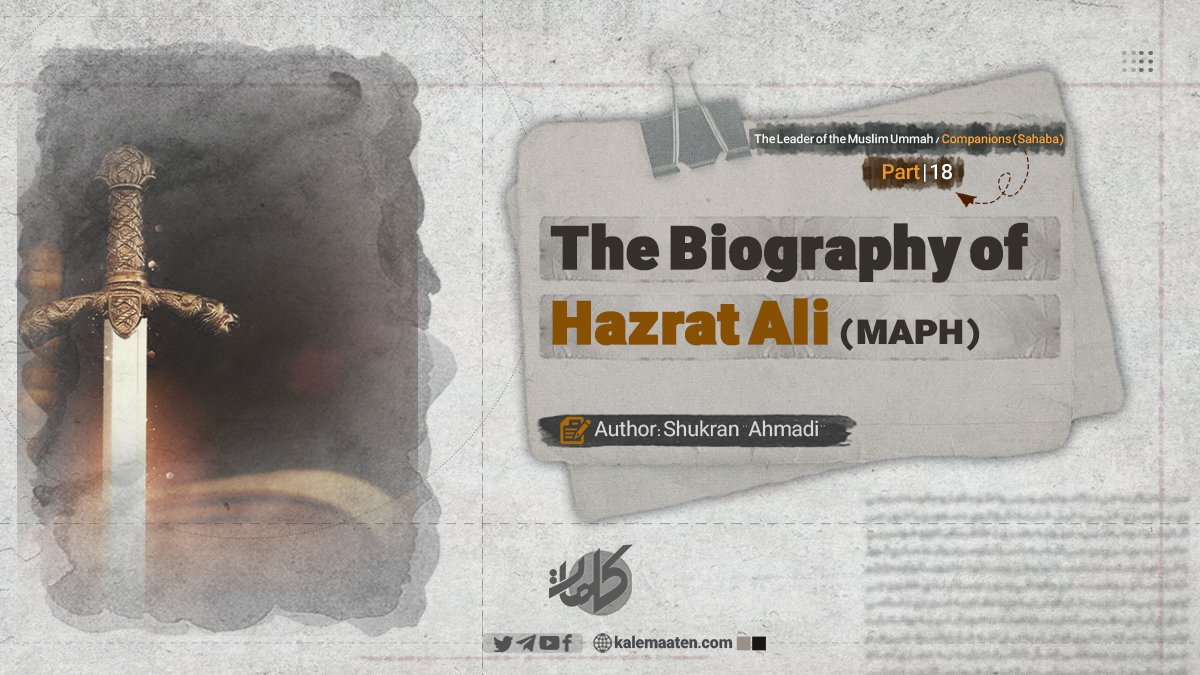Author: Shukran Ahmadi
The Biography of Hazrat Ali “MAPH” (Part 18)
Amr ibn Al-As (May Allah Be Pleased with Him) Joins Muawiya (May Allah Be Pleased with Him)
Amr ibn Al-As (may Allah be pleased with him) was the one who conquered Egypt and incorporated it into the Islamic domain. When the rebels besieged Usman (may Allah be pleased with him), Amr ibn Al-As was in Medina. The actions of the rebels forced him to leave Medina. Consequently, he traveled to Jerusalem with his two sons, Abdullah and Muhammad, to monitor the situation from there. He received updates on all events, from the martyrdom of Usman to the allegiance to Ali, the issue of avenging from Hazrat Usman murders, the Battle of the Jaml, and the martyrdom of Talha and Zubair. Eventually, when he learned that Ali (MAPH) planned to attack the land of Syria and that Amir Muawiya was preparing for defense, he noted that Muawiya’s reasoning was based on the fact that Ali had been appointed caliph by the rebels who had also martyred Usman. Furthermore, when Hazrat Ali was appointed, the major companions of the Prophet (peace be upon him) were absent from Medina and were not consulted in the selection of the caliph. Additionally, Ali (may Allah be pleased with him) had included the killers of Usman in his army. On the other hand, Ali (may Allah be pleased with him) believed that Muawiya, due to his kinship with the Prophet (peace be upon him) and his early conversion to Islam, could never be equal to him. Each side had its arguments for their stance. Under these circumstances, Amr ibn Al-As (may Allah be pleased with him) did not wish to remain neutral. He sought advice from his two sons on how to proceed. His son Abdullah ibn Amr (may Allah be pleased with him) advised: “Father, the Prophet (peace be upon him), Abu Bakr al-Siddiq, Umar al-Farooq, and Usman Zul-Nurayn were all pleased with you right until the end. Therefore, it is better for you to maintain your neutrality and prefer silence and seclusion until the people reach a consensus on one leader.”
However, his other son, Muhammad ibn Amr, countered: “Father, you are one of the trusted Arabs and an influential, knowledgeable person. If you do not get involved, how will the crisis be resolved?”
After listening to both pieces of advice, Amr ibn Al-As (may Allah be pleased with him) stated: “The improvement and righteousness of religion are in Abdullah’s advice, while the improvement and righteousness of worldly matters are in Muhammad’s advice.”
Eventually, after contemplation, he left Jerusalem for Damascus and went to Muawiya (may Allah be pleased with him). Muawiya welcomed Amr ibn al-As’s arrival. Amr ibn al-As told Muawiya: “Avenging the blood of the oppressed caliph is necessary, and your demand in this regard is justified.”
Although Muawiya initially approached Amr ibn al-As cautiously, he eventually grew to trust him and appointed him as an important member of the government, advisor, and minister. Amr ibn Al-As advised Muawiya that the blood-stained shirt of the oppressed caliph and the severed fingers of Naila should not be displayed daily, as this would gradually desensitize the people; they should only be shown occasionally. Muawiya accepted Amr’s advice.
Amr ibn al-As analyzed Ali’s position (may Allah be pleased with him) for Muawiya and the people of Syria, noting that Ali’s forces had weakened after the Battle of the Jaml, where about nine to ten thousand people of Basra had been killed. The remaining Basrains who had pledged allegiance to Ali could not establish a close relationship with the people of Kufa and thus would not display notable solidarity and heroism in combat. In fact, this analysis by Amr ibn Al-As was not incorrect, and the Sabaeans were also aware of this reality.



